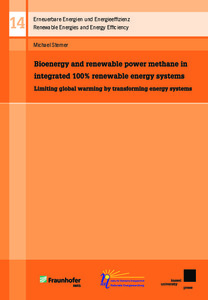| dc.date.accessioned | 2022-10-17T16:26:49Z | |
| dc.date.available | 2022-10-17T16:26:49Z | |
| dc.date.issued | 2009 | |
| dc.identifier | doi:10.17170/kobra-202210176997 | |
| dc.identifier.isbn | 978-3-89958-799-9 (e-book) | |
| dc.identifier.uri | http://hdl.handle.net/123456789/14197 | |
| dc.identifier.uri | urn:nbn:de:0002-7998 | |
| dc.description | Zugleich: Dissertation, Universität Kassel, 2009 | ger |
| dc.language.iso | eng | eng |
| dc.publisher | kassel university press | |
| dc.rights | Urheberrechtlich geschützt | |
| dc.rights.uri | https://rightsstatements.org/page/InC/1.0/ | |
| dc.rights.uri | | |
| dc.subject.ddc | 620 | |
| dc.title | Bioenergy and renewable power methane in integrated 100% renewable energy systems | eng |
| dc.type | Buch | |
| dcterms.abstract | The two major challenges in global energy systems are to reduce energy-related greenhouse gas emissions and to maintain energy supply security. This thesis presents one solution to both problems. It proposes strategies for the transformation of current energy systems into 100% renewable, stable and almost emission-free energy systems without making use of nuclear energy or carbon capture and storage.
Bioenergy is analyzed in the broader context of climate change, energy systems and land use. A techno-economic and ecologic analysis of 78 bioenergy pathways is done in order to identify the strategic role of bioenergy in future energy systems. For the first time, both traditional and modern biomass pathways are compared in a single assessment, identifying the range of maximum greenhouse gas reduction potential of bioenergy. However, the identified bioenergy potential is neither sufficient to balance fluctuating renewable power nor to fully replace fossil fuels in heat and transport on a global scale.
To solve this bottleneck, new concepts of converting renewable power into methane are developed. In this way, renewable power can be stored in the natural gas network and used temporarily and spatially flexible for balancing power, for heat and for long-distance transportation. It can be produced anywhere where water, air and renewable power are available and thus decrease import dependence on fossil fuels. The new approach can recycle CO2 in the energy system or even act as carbon sink in combination with CO2 storage: carbon sink energy system.
A transformation of the global energy systems is performed, reducing energy-related emissions by 95%. The role of such a transformation in global climate protection is analyzed and a 100% renewable power supply is simulated with an hourly resolution for Germany. By integrating smart power networks, heat networks and natural gas networks, the technical feasibility of a full renewable energy supply is demonstrated. | eng |
| dcterms.accessRights | open access | |
| dcterms.creator | Sterner, Michael | |
| dcterms.dateAccepted | 2009-09-23 | |
| dcterms.extent | XVIII, 208 Seiten | |
| dc.contributor.corporatename | Kassel, Universität Kassel, Fachbereich Elektrotechnik / Informatik | |
| dc.contributor.referee | Schmied, Jürgen (Prof. Dr.) | |
| dc.contributor.referee | Faulstich, Martin (Prof. Dr.) | |
| dc.publisher.place | Kassel | |
| dc.relation.isbn | 978-3-89958-798-2 (print) | |
| dc.subject.swd | Methanproduktion | ger |
| dc.subject.swd | Windenergie | ger |
| dc.subject.swd | Kohlendioxid | ger |
| dc.subject.swd | Energiespeicherung | ger |
| dc.subject.swd | Gasversorgungsnetz | ger |
| dc.subject.swd | Klimaschutz | ger |
| dc.subject.swd | Netzstabilität <Elektrische Energietechnik> | ger |
| dc.title.subtitle | Limiting global warming by transforming energy systems | eng |
| dc.type.version | publishedVersion | |
| dcterms.source.series | Erneuerbare Energien und Energieeffizienz - Renewable Energies and Energy Efficiency | |
| dcterms.source.volume | Band 14 | |
| kup.iskup | true | |
| kup.series | Erneuerbare Energien und Energieeffizienz - Renewable Energies and Energy Efficiency | |
| kup.subject | Naturwissenschaft, Technik, Informatik, Medizin | |
| kup.typ | Dissertation | |
| kup.institution | FB 16 / Elektrotechnik / Informatik | |
| kup.binding | Softcover | |
| kup.size | DIN A5 | |


